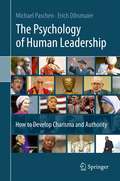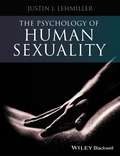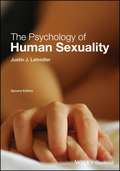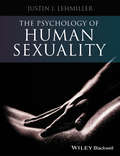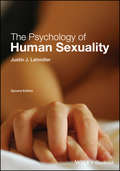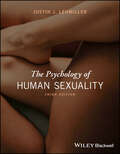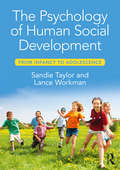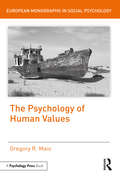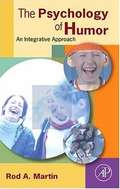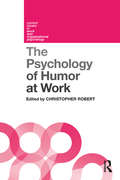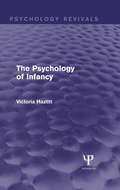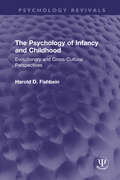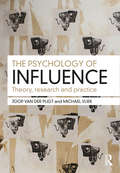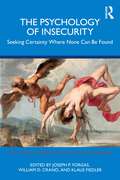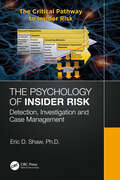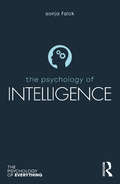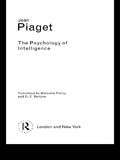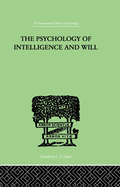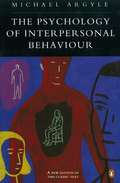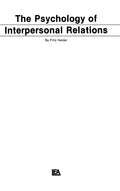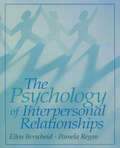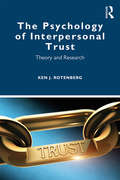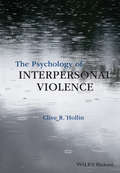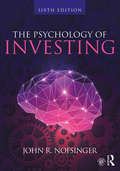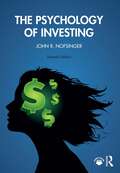- Table View
- List View
The Psychology of Human Leadership: How To Develop Charisma and Authority
by Erich Dihsmaier Michael PaschenThe book seamlessly links fundamental insights and practical approaches to address the most important leadership problems and challenges. Each of the 11 chapters takes a close look at a specific leadership aspect and explains how to develop personal leadership qualities, such as charisma, the ability to motivate others, assertiveness, and how to overcome crises and conflicts to create new structures. Ethical questions and possible negative developments in connection with leadership and power are also examined. Unlike conventional leadership manuals, this book on leadership goes beyond the standard 'recipes' and models by providing clear trains of thought as well as a psychological and philosophical basis, and by focusing on major achievements in terms of leadership, it creates a more profound understanding and holistic view of the subject of leadership, while promoting a genuine fascination for it.
The Psychology of Human Sexuality
by Justin J. LehmillerThis book offers a comprehensive overview of human sexual behavior from a biopsychosocial perspective.
The Psychology of Human Sexuality
by Justin J. Lehmiller<p>The thoroughly revised and updated second edition of The Psychology of Human Sexuality explores the roles that biology, psychology, and the social and cultural context play in shaping human sexual behavior. The author – a noted authority on the topic and an affiliate of the acclaimed Kinsey Institute - puts the spotlight on the most recent research and theory on human sexuality, with an emphasis on psychology. <p>The text presents the major theoretical perspectives on human sexuality, and details the vast diversity of sexual attitudes and behaviors that exist in the modern world. The author also reviews the history of sexology and explores its unique methods and ethical considerations. Overall, this important and comprehensive text provides readers with a better understanding of, and appreciation for, the science of sex and the amazing complexity of human sexuality.</p>
The Psychology of Human Sexuality
by Justin J. LehmillerThe Psychology of Human Sexuality offers a comprehensive overview of human sexual behavior from a biopsychosocial perspective. The text highlights psychological research and theory on human sexuality whilst also considering the biological, evolutionary, social, and cultural factors that influence our sex lives. Features comprehensive coverage of topics including gender and sexual orientation, relationships, sexual behaviors, sexual difficulties and solutions, prostitution, and pornography Offers more in-depth treatment of relationships than comparable texts, with separate chapters dealing with attraction and relationship processes Written from a sex-positive perspective, and is inclusive and respectful of a diverse audience Includes numerous activities to facilitate a dynamic and interactive classroom environment
The Psychology of Human Sexuality
by Justin J. LehmillerNew edition of an authoritative guide to human sexual behavior from a biopsychosocial perspective The thoroughly revised and updated second edition of The Psychology of Human Sexuality explores the roles that biology, psychology, and the social and cultural context play in shaping human sexual behavior. The author – a noted authority on the topic and an affiliate of the acclaimed Kinsey Institute - puts the spotlight on the most recent research and theory on human sexuality, with an emphasis on psychology. The text presents the major theoretical perspectives on human sexuality, and details the vast diversity of sexual attitudes and behaviors that exist in the modern world. The author also reviews the history of sexology and explores its unique methods and ethical considerations. Overall, this important and comprehensive text provides readers with a better understanding of, and appreciation for, the science of sex and the amazing complexity of human sexuality. Features broad coverage of topics including anatomy, gender and sexual orientation, sexual behaviors, sexual difficulties and solutions, prostitution, and pornography Offers more in-depth treatment of relationships than comparable texts, with separate chapters dealing with attraction and relationship processes Includes cutting-edge research on the origins of sexual orientation and gender identity, as well as new treatments for sexually transmitted infections and sexual dysfunctions Is written from a sex-positive perspective, with expanded coverage of cross-cultural research throughout and material that is inclusive and respectful of a diverse audience Includes numerous activities to facilitate dynamic, interactive classroom environments Written for students of human sexuality and anyone interested in the topic, The Psychology of Human Sexuality offers a guide to the psychology of human sexual behavior that is at once inclusive, thorough, and authoritative in its approach.
The Psychology of Human Sexuality
by Justin J. LehmillerThe Psychology of HUMAN SEXUALITY New edition of an authoritative guide to human sexual behavior from a biopsychosocial perspective The Psychology of Human Sexuality is a comprehensive guide to major theoretical perspectives on human sexuality and the vast diversity of sexual attitudes and behaviors around the world, with broad coverage of topics including anatomy, gender and sexual orientation, sexual behaviors, sexual difficulties and solutions, sex work and pornography. Written from a sex-positive perspective with material that is inclusive and respectful of a diverse audience, the text includes cutting edge research on the origins of sexual orientation and gender identity, as well as new treatments for sexually transmitted infections and diseases. To aid in student learning, the text is accompanied by online resources, including a test bank and instructor slides. Separate chapters deal with attraction and relationship processes. The Psychology of Human Sexuality includes information on: Sex science studies that researchers have failed to reliably replicate since the 2nd Edition was published, and the broader “replication crisis” in psychology “Graysexual” identities that fall on the spectrum between allosexual and asexual, and the sex recession of modern times Recent studies that shed light on sexual behavior in cultures that have previously been the subject of very little study Sex and disability, and “take-home messages” to allow readers to implement beneficial changes in their lives An important and comprehensive text that provides readers with a better understanding of, and appreciation for, the science of sex and sexual diversity, The Psychology of Human Sexuality is an essential resource for students of human sexuality in both intermediate and advanced undergraduate courses.
The Psychology of Human Social Development: From Infancy to Adolescence
by Sandie Taylor Lance WorkmanThe Psychology of Human Social Development provides a comprehensive introduction to the essential core topics and exciting new findings in this thriving field of developmental psychology. Following a thematic approach, the book looks at key topics in social development in childhood and adolescence, including personality development and research methods, taking the reader from first principles to an advanced understanding. The book explores socio-emotional development and social learning, as well as the history of thinking, and the evolutionary roots of social development, whilst also providing a clear balance between nature and nurture approaches. Taylor and Workman’s user-friendly writing style accommodates readers with no previous knowledge of the subject area whilst exploring the most up-to-date theories and research from various areas of psychology which have gained relevance to developmental psychology. Featuring student-friendly pedagogy throughout, including end-of-chapter summaries, further reading recommendations and questions for discussion, The Psychology of Human Social Development is essential reading for undergraduates on social development or developmental psychology courses and relevant for related fields such as education, gender studies and nursing.
The Psychology of Human Values (European Monographs in Social Psychology)
by Gregory R MaioThis original and engaging book advocates an unabashedly empirical approach to understanding human values: abstract ideals that we consider important, such as freedom, equality, achievement, helpfulness, security, tradition, and peace. Our values are relevant to everything we do, helping us choose between careers, schools, romantic partners, places to live, things to buy, who to vote for, and much more. There is enormous public interest in the psychology of values and a growing recognition of the need for a deeper understanding of the ways in which values are embedded in our attitudes and behavior. How do they affect our well-being, our relationships with other people, our prosperity, and our environment? In his examination of these questions, Maio focuses on tests of theories about values, through observations of what people actually think and do. In the past five decades, psychological research has learned a lot about values, and this book describes what we have learned and why it is important. It provides the first overview of psychological research looking at how we mentally represent and use our values, and constitutes important reading for psychology students at all levels, as well as academics in psychology and related social and health sciences.
The Psychology of Humor: An Integrative Approach
by Rod A. MartinResearch on humor is carried out in a number of areas in psychology, including the cognitive (What makes something funny?), developmental (when do we develop a sense of humor?), and social (how is humor used in social interactions?) Although there is enough interest in the area to have spawned several societies, the literature is dispersed in a number of primary journals, with little in the way of integration of the material into a book. Dr. Martin is one of the best known researchers in the area, and his research goes across subdisciplines in psychology to be of wide appeal. This is a singly authored monograph that provides in one source, a summary of information researchers might wish to know about research into the psychology of humor. The material is scholarly, but the presentation of the material is suitable for people unfamiliar with the subject-making the book suitable for use for advanced undergraduate and graduate level courses on the psychology of humor-which have not had a textbook source
The Psychology of Humor at Work: A Psychological Perspective
by Christopher RobertThis is the first book to look at the psychological processes that enable humor to affect people and teams in the workplace. It recognizes that humor plays many roles beyond making people feel happier and more productive, and acknowledges humor’s potential darker side as well. Bringing together a small but growing field of study, the book features chapters around core psychological topics such perception, creativity and stress, while also addressing organizational issues such as leadership, teamwork, and social networks. The collection concludes with chapters on the role of humor in recruitment processes, as well as how humor consultants work with organizations. Each chapter in The Psychology of Humor at Work not only provides a comprehensive review of what is known in that area, but also considers future directions for research and practice. It will prove fascinating reading for students, practitioners and researchers in organizational psychology, HRM, and business and management.
The Psychology of Infancy (Psychology Revivals)
by Victoria HazlittOriginally published in 1933, this volume was the result of many years’ careful first-hand study of child psychology enriched by the author’s unusually wide experience in dealing with the subject with students. It was intended to follow the development of children from infancy to adolescence, but was cut short due to the author’s untimely death. The book makes available the results of modern experimental work of the time, much of which was published in scattered journals. Chapters deal with the development of sensory and muscular control, including walking and talking, and with the development of the intellectual, emotional and social life of children up to three years of age. A pioneer in the development of experimental psychology Hazlitt’s work can now be enjoyed again in its historical context.
The Psychology of Infancy and Childhood: Evolutionary and Cross-Cultural Perspectives (Psychology Revivals)
by Harold D. FishbeinOriginally published in 1984, this book is a developmental psychology text with substantial evolutionary and cross-cultural work. It presents cognitive developmental issues, as well as personality, social and socialization issues, with an emphasis on culture. It also includes education-related research, such as material on schools, reading, mathematics, and IQ.
The Psychology of Influence: Theory, research and practice
by Joop Van Pligt Michael VliekWhether it’s our choice of a new car or what we think about our neighbours, our opinions and attitudes are a way of negotiating the world around us. The Psychology of Influence explores how these preferences and behaviours are influenced and affected by the messages we receive in daily life. From consumer choices to political, lifestyle and financial decisions, the book examines how and why we may be influenced by a range of sources, from written text and television to social media and interpersonal communication. In a field that has fascinated scholars since Plato, the book addresses the key questions across cognitive, social and emotional domains: When do arguments become persuasive? What influence do role models have? What role do simple rules of thumb, social norms or emotions play? Which behaviours are difficult to influence, and why? Covering topics from attraction, prejudice and discrimination to reward, punishment and unconscious bias, The Psychology of Influence will be invaluable reading for students and researchers across a range of areas within applied and social psychology, as well as those in political science, communications, marketing and business and management.
The Psychology of Insecurity: Seeking Certainty Where None Can Be Found (Sydney Symposium of Social Psychology)
by Joseph P. Forgas William D. Crano Klaus FiedlerInsecurity is an inevitable part of being human. Although life is insecure for every organism, humans alone are burdened by knowing that this is so. This ground-breaking volume features contributions by leading international researchers exploring the social psychology of insecurity and how existential, metaphysical, and social uncertainty influence human social behaviour. Chapters in the book investigate the psychological origins of insecurity, evolutionary theorizing about the functions of insecurity, the motivational strategies people adopt to manage insecurity, self-regulation strategies, the role of insecurity in the formation and maintenance of social relationships, and the influence of insecurity and uncertainty on the organization of larger social systems and public affairs. The chapters also discuss how insecurity influences many areas of contemporary social life, highlighting the applied implications of this line of research. Topics covered include the role of insecurity in social communication, social judgments, decision-making, group identification, morality, interpersonal behaviour, relationships, attitudes, and many applied aspects of social life and politics where understanding the psychology of insecurity is of critical importance. This accessible and engaging book will be of interest to students, researchers, and practitioners as a textbook or reference book in behavioural and social science fields, as well as to a broad spectrum of intelligent lay audiences seeking to understand one of the most intriguing issues that shapes human social life.
The Psychology of Insider Risk: Detection, Investigation and Case Management
by Eric ShawClinical psychologist and former intelligence officer Eric D. Shaw brings over 30 years of psychological consultation experience to the national security community, corporate investigations and law enforcement to this work on insider risk. After a career in counterterrorism, Dr. Shaw spent the last 20 years concentrating on insiders—employees who commit espionage, sabotage, intellectual property theft, present risks of harm to self and others, and other workplace risks, especially those influenced by mental health conditions. Dr. Shaw is the author of the Critical Pathway to Insider Risk (CPIR) which addresses the characteristics, experiences and connections at-risk employees bring to our organizations, the stressors that trigger higher levels of risk, the concerning behaviors that signal this risk has increased and the action or inaction by organizations that escalate insider risk. The CPIR also examines what these employees look like when they have broken bad and the personal characteristics, resources and support that can mitigate these risks. Dr. Shaw also examines specific risk accelerators like subject disgruntlement, personality disorders and problematic organizational responses that can escalate the speed and intensity of insider risks. The investigative applications, strengths and weaknesses of the CPIR are also considered. This work also describes the behavioral science tools deployed in insider investigations, especially those designed to locate and understand persons at-risk and help organizations intervene to avoid escalation or manage potential damage. Case examples are drawn from intelligence community, corporate and law enforcement investigations. Specific insider cases where the use of behavioral science tools is described in detail include leaks, anonymous threats, erotomania, hacking, violence risk, mass destruction threats and espionage. The work closes with consideration of the many current and future challenges insider risk professionals face. These include the challenge of recognizing suicidal ideation as a gateway to other forms of insider risk, understanding when subject therapy will, and will not reduce risk, deciphering belief in conspiracy theory from significant extremist risk, appreciating insider threats to our elections and the unique challenges posed when the insider is a leader.
The Psychology of Intelligence (The Psychology of Everything)
by Sonja FalckWhat fascinates us about intelligence? How does intelligence impact our daily lives? Why do we sometimes fear intelligence? Human intelligence is a vital resource, yet the study of it is pervaded by neglect and misconceptions. The Psychology of Intelligence helps make sense of the contradictory social attitudes and practices in relation to intelligence that we have seen over the decades, from the idea that it drove eugenicist policies and actions in the past, to our current backlash against "experts" and critical thinking. Showing how our approach to intelligence impacts our everyday lives in educational, occupational, medical, and legal settings, the book asks if it is possible to lift the taboo and move beyond the prejudices surrounding intelligence. Challenging popular assumptions, The Psychology of Intelligence encourages us to face intelligence in ourselves and others as an important fact of life that we can all benefit from embracing more openly.
The Psychology of Intelligence
by Jean PiagetThink of developmental psychology, and the name of Jean Piaget immediately springs to mind. His theory of learning lies at the very heart of the modern understanding of the human learning process, and he is celebrated as the founding father of child psychology. A prolific writer, is the author of more than fifty books and several hundred articles. The Psychology of Intelligence is one of his most important works. Containing a complete synthesis of his thoughts on the mechanisms of intellectual development, it is an extraordinary volume by an extraordinary writer. Given his significance, it is hardly surprising that Psychology Today pronounced Piaget the Best Psychologist of the twentieth century.
The Psychology Of Intelligence And Will
by Wyatt, H GFirst Published in 1999. Routledge is an imprint of Taylor & Francis, an informa company.
The Psychology of Interpersonal Behaviour
by Michael ArgyleThe first edition of this book outlined what amounted to a breakthrough in the analysis of social behaviour. Since then it has become widely used as an introductory textbook of social psychology. It is invaluable to anyone interested in the subject or whose work involves dealing with people, as well as anyone who wants to know how to make friends and influence people. For this new, fifth edition, Michael Argyle includes the latest research on non-verbal communication, social skills and happiness.
The Psychology of Interpersonal Relations
by F. HeiderPublished in the year 1982, The Psychology of Interpersonal Relations is a valuable contribution to the field of Social Psychology.
The Psychology of Interpersonal Relationships
by Ellen S. Berscheid Pamela C. ReganThis textbook provides an integrated and organized foundation for students seeking a brief but comprehensive introduction to the field of relationship science. It emphasizes the relationship field's intellectual themes, roots, and milestones; discusses its key constructs and their conceptualizations; describes its methodologies and classic studies; and, most important, presents the theories that have guided relationship scholars and produced the field's major research themes.
The Psychology of Interpersonal Trust: Theory and Research
by Ken J. RotenbergTrust is a crucial facet of social functioning that feeds into our relationships with individuals, groups, and organizations. The Psychology of Interpersonal Trust: Theory and Research examines existing theories, frameworks, and models of trust as well as the methods and designs for examining it. To fully examine how interpersonal trust impacts our lives, Rotenberg reviews the many essential topics trust relates to, including close relationships, trust games, behavioural trust, and trust development. Designed to encourage researchers to recognize the links between different approaches to trust, this book begins with an overview of the different approaches to interpersonal trust and a description of the methods used to investigate it. Following on from this, each chapter introduces a new subtopic or context, including lying, adjustment, socialization, social media, politics, and health. Each subtopic begins with a short monologue (to provide a personal perspective) and covers basic theory and research. Rotenberg’s applied focus demonstrates the relevance of interpersonal trust and highlights the issues and problems people face in contemporary society. This is essential reading for students, researchers, and academics in social psychology, especially those with a specific interest in the concept of trust.
The Psychology of Interpersonal Violence
by Clive R. HollinThe Psychology of Interpersonal Violence is a textbook which gives comprehensive coverage of interpersonal violence - exploring the various violent acts that occur between individuals in contemporary society. Examines in detail the controversial use of corporal punishment Explores ways that psychology can add to our understanding of interpersonal violence Offers directions for future research that can help to prevent or reduce incidents of interpersonal violence
The Psychology of Investing
by John R. NofsingerWhile traditional finance focuses on the tools used to optimize return and minimize risk, this book explains how psychology can affect our decisions more than financial theory. Covering the ways investors actually behave, this is the first book of its kind to delve into the ways biases influence investment behavior, and how overcoming these biases can increase financial success. Now in its sixth edition, this classic text features: An easy-to-understand structure, illustrating psychological biases as everyday behavior; analyzing their effect on investment decisions; and concluding with academic studies that exhibit real-life investors making choices that hurt their wealth. A new chapter on the biology of investment, exploring the latest research on genetics, neuroscience, and how hormones, aging, and nature versus nurture inform our investment behavior. An additional strategy for controlling biases, helping readers understand the psychology that motivates markets and how to address it. Experiential examples, chapter summaries, and end-of-chapter discussion questions to help readers test their practical understanding. Fully updated with the latest research in the field, The Psychology of Investing will prove fascinating and educational for advanced students in investment, portfolio management, and behavioral finance classes as well as investors and financial planners.
The Psychology of Investing
by John R. NofsingerWhile traditional finance focuses on the tools used to optimize return and minimize risk, this book shows how psychology can explain our decisions more than financial theory. Analyzing how investors behave in the real world, this is the first book of its kind to delve into the ways biases influence investment behavior, and how overcoming these biases can increase financial success. Now in its seventh edition, this classic text features: An easy-to-understand structure, illustrating psychological biases as everyday behavior; analyzing their effect on investment decisions; and concluding with academic studies that show real-life investors making choices that hurt their wealth New content on fintech and cryptocurrencies, the role of social media in investing, generational biases, and the COVID-19 pandemic Experiential examples, chapter summaries, and end-of-chapter discussion questions to help readers test their practical understanding Online supplements comprising PowerPoint slides for both students and lecturers Fully updated with the latest research in the field, The Psychology of Investing will prove fascinating and educational for advanced students in behavioral finance, investment and portfolio management classes, as well as investors and financial planners.
